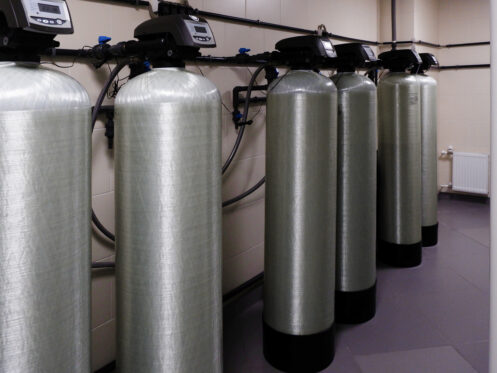If you live in an area with hard water, you are likely all too familiar with its negative effects. From corroding your plumbing and fixtures to making keeping your home clean difficult, hard water can be more than just a nuisance in your home. However, having a plumber install a water-softening system can solve your issues with excessive minerals in your home’s water supply. They are effective and easy to maintain.
How Does a Water Softening System Work?
A water softening system operates on the principle of ion exchange to remove minerals like calcium and magnesium that cause water hardness. Ion exchange is a chemical process where ions in a solution are exchanged for ions of the same charge in a solid material. In the context of water softening, resin beads are typically used as the solid material. These resin beads are coated with negatively charged sites.
When hard water containing positively charged ions like calcium and magnesium flows through the resin bed, the positively charged ions are attracted to the negatively charged sites on the resin beads. This attraction is due to opposite charges attracting each other, similar to how magnets work.
As a result, the calcium and magnesium ions in the water attach themselves to the resin beads, displacing the sodium ions on the beads. This exchange process effectively removes the calcium and magnesium ions from the water, softening it in the process.
Once the resin beads become saturated with calcium and magnesium ions, they need to be regenerated. This involves flushing them with a concentrated salt solution from a separate brine tank. The sodium ions in the brine solution displace the calcium and magnesium ions from the resin beads, allowing them to be flushed away in the home’s drainage system.
The resin beads are again saturated with sodium ions after the regeneration process and ready to exchange with calcium and magnesium ions in the incoming hard water. This entire process occurs automatically. The frequency of regeneration depends on the hardness of the water and the amount of water used.
Water-softening systems typically comprise multiple components beyond the primary ion exchange unit and brine tank. These additional components serve various functions to ensure efficient operation and water quality.
Sediment Filters
Often included in water-softening setups, these filters remove sediment and larger particles from the water before it enters the softening system. This helps prevent clogging and ensures the system’s optimal performance. They also remove contaminants from your household’s drinking water.
Control Valves
Control valves play a crucial role in regulating water flow through the system. They control water movement during softening and regeneration, ensuring each stage occurs smoothly.
Automatic Sensors
Most modern water-softening systems feature automatic sensors that monitor various aspects of the system’s function. These sensors can detect excessive water usage and malfunctions in the system. They also let you know when to add salt to the brine tank and if the system needs to be cleaned.
Maintaining a water-softening system is relatively easy. Regular maintenance typically involves three main tasks: replenishing salt, periodic cleaning, and replacing the resin beads every 10 to 15 years. Generally, homeowners should check the salt level in the brine tank regularly, aiming to keep it at least half-full to ensure uninterrupted water softening. Depending on usage, salt may need to be added every few weeks to a few months.
Periodic cleaning is necessary to remove sediment and debris that build up in a water softener over time. For most people, this means cleaning their system every six to 12 months. However, some systems may require more frequent cleaning, especially in areas with particularly hard water or high sediment levels. The cleaning process involves flushing the resin bed and cleaning the brine tank.
Water Softening System Benefits
Knowing the benefits of a water-softening system can help determine whether you should invest in one.
Protects Your Appliances
Installing a water softener can significantly benefit your appliances in several ways. Firstly, by removing minerals like calcium and magnesium from the water, a water softener prevents scale buildup in appliances such as water heaters, dishwashers, and washing machines. This scale buildup can decrease the efficiency of these appliances, resulting in higher monthly utility costs. The buildup can also reduce the lifetime of your appliances, forcing you to replace them prematurely. In addition, appliances that use softened water are less prone to malfunctions and breakdowns, reducing maintenance costs and inconvenience.
Better Tasting Water
Hard water has a specific taste due to the minerals contained in it, which makes it unpleasant for many people. Bitterness, accompanied by a metallic taste, can spoil the water’s taste. With those minerals removed via water softening, your water will be pure, clear and refreshing to drink straight from the tap. Better-tasting water will encourage your family to drink more, which is good for their health. It also eliminates the expense of buying bottled water. Additionally, whether you are cooking or using the treated water to brew a cup of coffee or tea, softened water will make everything you consume taste better.
Eliminates Hard Water Issues When Doing Laundry and Dishes
When you use hard water for laundry, it can leave behind mineral deposits on your clothing, causing it to appear dull, stiff, or discolored over time. Additionally, the minerals in hard water can react with laundry detergents, reducing their effectiveness and requiring more detergent and a longer washing cycle to get your clothes clean.
Similarly, when you wash dishes with hard water, mineral deposits can form on your dishes, glasses, and utensils, leading to spots, streaks, and a cloudy appearance. Furthermore, hard water may inhibit the foaming of dish soap, making it more challenging to get everything clean.
Improves Your Skin and Hair
Are you tired of irritated skin and brittle hair because of your water? Hard water is rich in minerals that strip the oil from the skin and hair, making them dry and dull. Hard water also leaves a film on your skin that blocks pores and aggravates conditions like eczema and acne. The switch to softened water can result in healthier, more radiant skin and hair.
Extends the Lifetime of Your Plumbing
Softening systems remove calcium and magnesium from your home’s water, preventing the accumulation of scale and mineral deposits within pipes and fittings. This reduction helps maintain water flow throughout the plumbing system, preventing clogs and blockages that can lead to reduced water pressure or even burst pipes. Additionally, softened water is less corrosive than hard water, prolonging the lifespan of pipes and reducing the risk of corrosion-related damage.
After having a water softening system installed, it is recommended that you have a professional clean your plumbing. They can use a variety of techniques, such as hydro-jetting, to remove blockages caused by years of mineral, grease, and soap-scum buildup. Regular maintenance combined with a water softener will reduce the need for costly plumbing repairs in the long run.
Contact the Professionals
At Christian Brothers Air Conditioning Plumbing Electrical, we are a locally owned and family-run business that has been serving the residents of Glendale, AZ and the surrounding areas since 1976. We install, repair, and maintain heating and cooling systems. In addition, we provide electrical services, including installing EV stations, and are expert plumbers. Contact us today to schedule an appointment with one of our team members.










